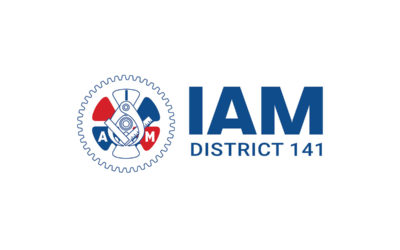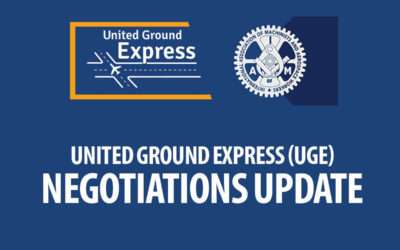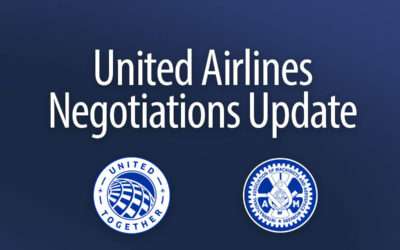
The Supreme Court may soon overturn a lower court ruling the held that Federal Regulators are better suited than tort courts to deal with company / union disputes.
Supreme Court Poised for New Attack on Unions
IAM141.org
5 October 2022
On Monday, the U.S. Supreme Court agreed to decide a case that could determine if unions should be forced to cover some financial losses their companies experience due to union actions, such as strikes.
The case will decide if employers can bypass Federal Labor regulators and sue unions directly in court. Currently, labor disputes are settled by specialized Federal regulators, to avoid tying up the court system and to prevent litigation designed solely for the purpose of harassing or bankrupting unions. The court will decide whether or not to remove those safeguards.
The Court granted Glacier Northwest, Inc., a concrete mixing and delivery company, a request to review an earlier decision by the Washington State Supreme Court, which ruled against the company in favor of the workers. That ruling found that the strike fell under rules set up by the National Labor Relations Act (NLRA) and that companies cannot sue over such conduct. Rather, such matters must be litigated before the National Labor Relations Board. In agreeing to take up the case, the U.S. Supreme Court could potentially reverse the earlier decision.
Such a ruling could allow companies to sue unions outside of the Labor Board, possibly requiring them to repay employers if they claim union business was unduly burdensome. For example, if a legal, peaceful union job action slowed production, caused canceled deliveries, or spoiled inventory left at worksites by workers walking off the property.
Airlines and other transportation-sector unions are covered under the Railway Labor Act and regulated by a different Federal Agency; the National Mediation Board. Under these rules, airlines must win express clearances from the Federal Government before they can strike. However, the case has the potential to impact air and rail workers granted authorization to conduct work actions. The upcoming Supreme Court decision could impact all unions, not just those falling under the NLRA.
The case, Glacier Northwest Inc. v. International Brotherhood of Teamsters, Local Union 174, involves a strike action by concrete-mixer truck drivers working for Glacier Northwest in Washington State. The truck drivers asked for better health care options for recent retirees and cost-of-living increases in pay. When Company management refused, the drivers voted to go on strike.
The strike began after the management ordered many drivers to load their mixers with concrete, which must be delivered to customers the same day. If it is not used in time, the concrete will harden and have to be dumped. Hardening concrete can also damage mixing trucks, although no such damage occurred. The strike began after many drivers filled their mixing trucks or left on deliveries, which meant someone else needed to deliver concrete and rinse the trucks. Since managers had failed to staff adequately, some deliveries had to be called off, and some of the concrete had to be thrown out.
Glacier sued the union in state court, claiming the drivers had “vandalized” company property and sabotaged the operation by not completing their deliveries and rinsing their trucks before going on strike. The complaint alleged that the union engaged in trespassing, interfering with company contracts, and civil conspiracy.
The union argued that the legal strike was protected under the NLRA, and the company could have chosen to find temporary drivers. Moreover, the drivers said that the matter had to be resolved by the National Labor Relations Board, not in state court, since it was a labor dispute.
Additionally, the union pointed out that the trucks were returned to the worksite and left running – precisely to prevent the concrete from hardening. Glacier made the deliberate choice to dump the concrete after refusing to staff the operation in anticipation of a possible strike. This was not a decision made by the truck drivers, and they had no power to force the company to take any set of actions after the strike was called.
In December, the Washington State Supreme Court agreed with the truck drivers and found the lost concrete was incidental to the strike action and that the NLRB is better suited to determine if the drivers did anything unlawful.
In response to the company’s claims, the Washington Supreme Court noted the fact that protected a union job action can, “bring ‘inconvenience and economic loss’ does not render it unprotected.”
Glacier then petitioned the U.S. Supreme Court, asking Justices to overturn the state ruling in favor of the union. In that filing, the company argues that the NLRA should no longer be allowed to pre-empt state tort courts in cases when unions are accused of “intentionally destroying an employer’s property.”
If the Supreme Court ultimately rules against the union, the decision would expose organized workplaces to many new legal threats and draining, pointless litigation. Principally, unions will face the genuine danger of expensive company-funded litigation becoming routine, even if the cases are eventually thrown out. Such a ruling would hand employers the power to baselessly accuse their unionized workers of criminal acts that must be decided in state courts rather than by the Federal Agencies tasked with arbitrating labor disputes.
In 2018, the Supreme Court handed down the infamous Janus v. AFSCME decision, hoping to bankrupt public-sector unions by forcing them to provide union work, marketable skills, and property to anti-union actors on demand. Janus also forces public workers to pay for political and anti-union speech and acts they oppose. Anti-union forces hoped masses of union members, given a chance to collect union wages, work rules, and benefits without helping pay for any of it would seize the opportunity, thus bankrupting organized labor.
That effort failed. In part because anti-union forces thought unions were as unpopular as they say they are, unaware that more than 70% of American workers support unionism. The Glacier v. Teamsters decision can potentially give a powerful new weapon to billion and trillion-dollar corporations to sue unions out of existence. And this time, unlike under Janus, the High Court might not limit that weapon to certain types of unions under specific Federal regulators. And, this time, it won’t depend on proud union members betraying their coworkers.
Emirates Hit with $1.8 Million Fine for JetBlue Code Share Flights
Emirates Hit with $1.8 Million Fine for JetBlue Code Share FlightsWASHINGTON - The USDOT has fined Emirates Airlines $1.8 million for flying through prohibited airspace over Iraq at an unsafe altitude. The flights were part of a code share agreement with JetBlue...
Federal Judge Slaps Down JetBlue-Spirit Merger, Citing Competition Concerns
Federal Judge Slaps Down JetBlue-Spirit Merger, Citing Competition ConcernsU.S. District Judge William Young blocked the $3.8 billion attempt by Jetblue to purchase Spirit Airlines, citing monopolistic concerns. The decision is a victory for the Biden Administration,...
Related News
Important Statement Re: Hybrid Move Teams At Line Stations
I’m writing to clear up some confusion regarding a 2021 Memorandum of Understanding (MOU) that established Hybrid Move Teams specifically for LINE STATIONS. It appears there’s been a misunderstanding, leading to some inaccurate information circulating among our Move...
United Ground Express Negotiations Update (23 June 2025)
Over the week of June 16—20, our IAM District 141 negotiating team met in Chicago with United Ground Express management. We worked to advance the remaining sections of our first collective-bargaining agreement. We are pleased to report continued forward movement and...
United Airlines Negotiations Update 17 June
Last week in Chicago, our IAM District 141 team met with United management to resume work on all seven collective-bargaining agreements. The Fleet Technical Instructor (FTI) and Security Officer sub-committees were also present and submitted updated proposals.United...

Supreme Court Poised to Renew Attack on Unions
5 October, 2022
On Monday, the U.S. Supreme Court agreed to decide a case that could determine if unions should be forced to cover some financial losses their companies experience due to union actions, such as strikes.
The case will decide if employers can bypass Federal Labor regulators and sue unions directly in court. Currently, labor disputes are settled by specialized Federal regulators, to avoid tying up the court system and to prevent litigation designed solely for the purpose of harassing or bankrupting unions. The court will decide whether or not to remove those safeguards.
The Court granted Glacier Northwest, Inc., a concrete mixing and delivery company, a request to review an earlier decision by the Washington State Supreme Court, which ruled against the company in favor of the workers. That ruling found that the strike fell under rules set up by the National Labor Relations Act (NLRA) and that companies cannot sue over such conduct. Rather, such matters must be litigated before the National Labor Relations Board. In agreeing to take up the case, the U.S. Supreme Court could potentially reverse the earlier decision.
Such a ruling could allow companies to sue unions outside of the Labor Board, possibly requiring them to repay employers if they claim union business was unduly burdensome. For example, if a legal, peaceful union job action slowed production, caused canceled deliveries, or spoiled inventory left at worksites by workers walking off the property.
Airlines and other transportation-sector unions are covered under the Railway Labor Act and regulated by a different Federal Agency; the National Mediation Board. Under these rules, airlines must win express clearances from the Federal Government before they can strike. However, the case has the potential to impact air and rail workers granted authorization to conduct work actions. The upcoming Supreme Court decision could impact all unions, not just those falling under the NLRA.
The case, Glacier Northwest Inc. v. International Brotherhood of Teamsters, Local Union 174, involves a strike action by concrete-mixer truck drivers working for Glacier Northwest in Washington State. The truck drivers asked for better health care options for recent retirees and cost-of-living increases in pay. When Company management refused, the drivers voted to go on strike.
The strike began after the management ordered many drivers to load their mixers with concrete, which must be delivered to customers the same day. If it is not used in time, the concrete will harden and have to be dumped. Hardening concrete can also damage mixing trucks, although no such damage occurred. The strike began after many drivers filled their mixing trucks or left on deliveries, which meant someone else needed to deliver concrete and rinse the trucks. Since managers had failed to staff adequately, some deliveries had to be called off, and some of the concrete had to be thrown out.
Glacier sued the union in state court, claiming the drivers had “vandalized” company property and sabotaged the operation by not completing their deliveries and rinsing their trucks before going on strike. The complaint alleged that the union engaged in trespassing, interfering with company contracts, and civil conspiracy.
The union argued that the legal strike was protected under the NLRA, and the company could have chosen to find temporary drivers. Moreover, the drivers said that the matter had to be resolved by the National Labor Relations Board, not in state court, since it was a labor dispute.
Additionally, the union pointed out that the trucks were returned to the worksite and left running – precisely to prevent the concrete from hardening. Glacier made the deliberate choice to dump the concrete after refusing to staff the operation in anticipation of a possible strike. This was not a decision made by the truck drivers, and they had no power to force the company to take any set of actions after the strike was called.
In December, the Washington State Supreme Court agreed with the truck drivers and found the lost concrete was incidental to the strike action and that the NLRB is better suited to determine if the drivers did anything unlawful.
In response to complaints that the strike had inspired Company to destroy undelivered concrete. However, as the Washington Supreme Court noted, the fact that protected union job actions can, “bring ‘inconvenience and economic loss’ does not render it unprotected.”
Glacier then petitioned the U.S. Supreme Court, asking Justices to overturn the state ruling in favor of the union. In that filing, the company argues that the NLRA should no longer be allowed to pre-empt state tort courts in cases when unions are accused of “intentionally destroying an employer’s property.”
If the Supreme Court ultimately rules against the union, the decision would expose organized workplaces to many new legal threats and draining, pointless litigation. Principally, unions will face the genuine danger of expensive company-funded litigation becoming routine, even if the cases are eventually thrown out. Such a ruling would hand employers the power to baselessly accuse their unionized workers of criminal acts that must be decided in state courts rather than by the Federal Agencies tasked with arbitrating labor disputes.
In 2018, the Supreme Court handed down the infamous Janus v. AFSCME decision, hoping to bankrupt public-sector unions by forcing them to provide union work, marketable skills, and property to anti-union actors on demand. Janus also forces public workers to pay for political and anti-union speech and acts they oppose. Anti-union forces hoped masses of union members, given a chance to collect union wages, work rules, and benefits without helping pay for any of it would seize the opportunity, thus bankrupting organized labor.
That effort failed. In part because anti-union forces thought unions were as unpopular as they say they are, unaware that more than 70% of American workers support unionism. The Glacier v. Teamsters decision can potentially give a powerful new weapon to billion and trillion-dollar corporations to sue unions out of existence. And this time, unlike under Janus, the High Court might not limit that weapon to certain types of unions under specific Federal regulators. And, this time, it won’t depend on proud union members betraying their coworkers.
Related News
Important Statement Re: Hybrid Move Teams At Line Stations
I’m writing to clear up some confusion regarding a 2021 Memorandum of Understanding (MOU) that established Hybrid Move Teams specifically for LINE STATIONS. It appears there’s been a misunderstanding, leading to some inaccurate information circulating among our Move...
United Ground Express Negotiations Update (23 June 2025)
Over the week of June 16—20, our IAM District 141 negotiating team met in Chicago with United Ground Express management. We worked to advance the remaining sections of our first collective-bargaining agreement. We are pleased to report continued forward movement and...
United Airlines Negotiations Update 17 June
Last week in Chicago, our IAM District 141 team met with United management to resume work on all seven collective-bargaining agreements. The Fleet Technical Instructor (FTI) and Security Officer sub-committees were also present and submitted updated proposals.United...








